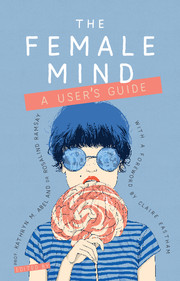Book contents
- Frontmatter
- Acknowledgements
- Contents
- Foreword
- Introduction: being female
- Part I Women in perspective
- Part II Women and society
- Part III Women and their environment
- Part IV Women and specific disorders
- 18 Depression and other mood disorders
- 19 Anxiety disorders
- 20 Trauma and post-traumatic stress disorder
- 21 The dangers of rumination
- 22 Obsessive–compulsive disorder
- 23 Eating disorders and body dysmorphic disorder
- 24 Psychosexual disorders
- 25 Personality disorders: risks and recovery
- 26 Self-harm
- 27 Women and addiction
- 28 Autism spectrum disorder
- 29 Attention-deficit hyperactivity disorder
- 30 Psychotic illness
- 31 Postnatal depression and postpartum psychosis
- 32 Living longer: normal age-related changes, dementia and depression
- Part V Women and treatment
- Contributors
- Index
31 - Postnatal depression and postpartum psychosis
from Part IV - Women and specific disorders
Published online by Cambridge University Press: 02 January 2018
- Frontmatter
- Acknowledgements
- Contents
- Foreword
- Introduction: being female
- Part I Women in perspective
- Part II Women and society
- Part III Women and their environment
- Part IV Women and specific disorders
- 18 Depression and other mood disorders
- 19 Anxiety disorders
- 20 Trauma and post-traumatic stress disorder
- 21 The dangers of rumination
- 22 Obsessive–compulsive disorder
- 23 Eating disorders and body dysmorphic disorder
- 24 Psychosexual disorders
- 25 Personality disorders: risks and recovery
- 26 Self-harm
- 27 Women and addiction
- 28 Autism spectrum disorder
- 29 Attention-deficit hyperactivity disorder
- 30 Psychotic illness
- 31 Postnatal depression and postpartum psychosis
- 32 Living longer: normal age-related changes, dementia and depression
- Part V Women and treatment
- Contributors
- Index
Summary
Postnatal depression
Susan's story
Susan, a 27-year-old single mother, had an unplanned pregnancy. She was worried about how she would cope with another baby. She had recently left her partner because of domestic abuse. Six weeks after her baby was born, she started to feel low, was unable to get to sleep and lost her appetite. She had less interest in her children and found everything a struggle. She felt guilty that she did not love her baby. She considered taking an overdose but did not want to harm herself because there was nobody else to look after her children.
Her health visitor asked her how she was feeling, but she was scared to tell her – she thought it would show she was a bad mother and that her children would be taken away. When she took her baby to her general practitioner (GP), she burst into tears and told the GP how she felt. The GP referred her to a psychologist and her health visitor invited her to a support group for mothers with postnatal depression. She found this really helpful and gradually recovered.
Postnatal depression (PND) is an illness that affects 10–15% of women who have a baby. It often starts 1–2 months after birth, but can begin several months later. For a third of women with postnatal depression, their symptoms start in pregnancy.
Some women feel ashamed or guilty about feeling depressed when everyone expects them to be happy about having a baby. PND is nobody's fault. It can happen to anyone. Having a baby is one of the biggest life changes women experience and can be stressful. Women often feel under pressure to live up to their own or others’ expectations.
There are many causes of PND; previous mental illness, lack of support, previous abuse, domestic abuse, stressful life events (e.g. relationships ending) and physical illness (e.g. underactive thyroid) can all contribute. Many different mental health problems can affect women in pregnancy and after birth, not just PND. It is important to get the diagnosis right so that the right treatment can be obtained.
- Type
- Chapter
- Information
- The Female MindUser's Guide, pp. 202 - 210Publisher: Royal College of PsychiatristsPrint publication year: 2017

